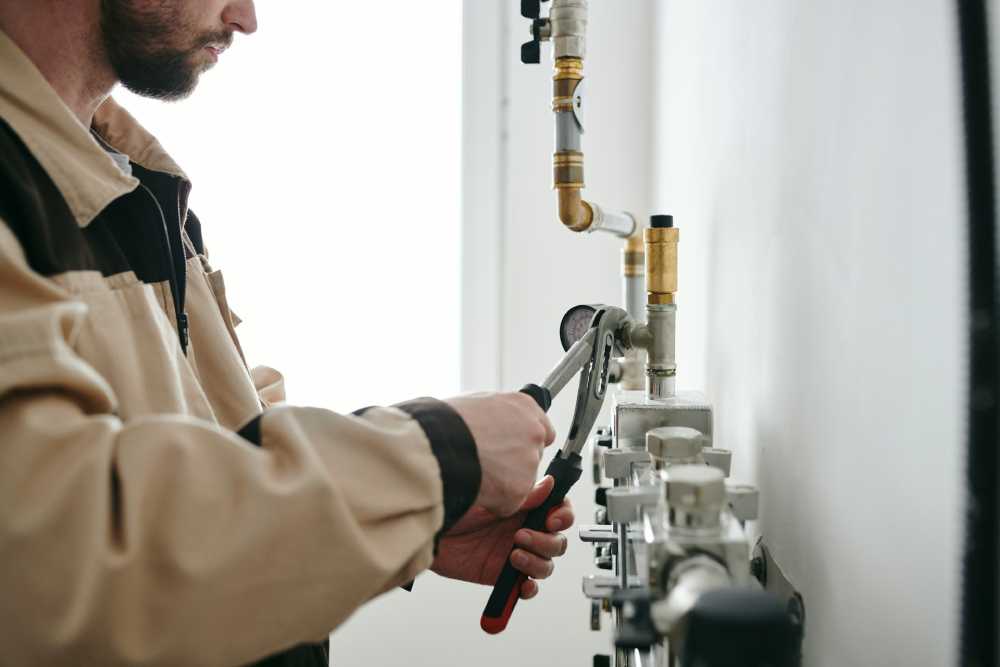
Any home’s comfort, safety, and efficiency largely depend on the proper functioning of its core systems. Plumbing, HVAC, and electrical frameworks are three pivotal elements that contribute to a secure and comfortable living environment.
Regular upkeep of these systems by experts such as PM247 is necessary for longevity. It contributes to energy conservation, helping households in areas with fluctuating climates keep their homes at peak operational performance. Strategic maintenance schedules can assist in identifying issues early on, saving homeowners from unexpected and often costly repairs.
Professional HVAC Maintenance: When to Call the Experts
While some HVAC maintenance tasks can be easily managed, some indications call for expert intervention. Homeowners should be alert to symptoms such as unexpected changes in temperature, strange noises, or an unexplained increase in utility costs.
These can indicate an underlying issue requiring a professional’s diagnostic skills. Contacting a skilled technician who is familiar with the peculiarities of a Delaware HVAC system is essential when these warning signs arise.
Trained professionals can also carry out precise tasks, including duct cleaning and coolant refills, which are crucial for the efficient running of the system. A routine professional check-up can also encompass tune-ups that enhance overall performance, thus reducing the need for costly repairs or early system replacements.
Finally, if you’re looking for professionals, you might consider visiting websites like eshenaurs.com to find expert HVAC services that can handle these needs.
The Essentials of Plumbing Maintenance
The intricate network of pipes and fixtures that comprise a home’s plumbing system requires routine attention to ensure that clean water flows in and wastewater efficiently drains out.
Preventative plumbing maintenance extends beyond avoiding blockages or leaks; it involves understanding how water quality, the integrity of pipes, and the functionality of sewage systems interact.
By establishing preventive habits, like avoiding the disposal of oils and non-biodegradable items down the drain, homeowners can significantly reduce the likelihood of clogs and preserve the health of their plumbing systems.
Regularly inspecting pipes for signs of corrosion or damage can prolong the system’s longevity and help avert plumbing emergencies.
Recognizing the Signs of Plumbing Issues
Identifying plumbing problems when they are still manageable can prevent them from escalating into more significant and expensive repairs. Critical indicators of potential plumbing issues include:
- Varying water pressure throughout the house.
- Slow-draining sinks.
- Water stains on walls or ceilings.
- Unexplainable increases in water bills.
Homeowners should regularly check exposed piping, shut-off valves, and appliance connections to catch leaks early. By proactively addressing minor problems before they worsen, residents can maintain a steady and reliable plumbing system throughout their domicile.
HVAC System Longevity and Care
An HVAC system is crucial in maintaining indoor comfort throughout the year, and regular upkeep plays a pivotal role in its performance and lifespan. The air filters of an HVAC system, in particular, are fundamental to sustaining clean indoor air and maintaining the unit’s efficiency.
Filters clogged with dust and allergens can restrict airflow, forcing the system to work harder and increasing wear and tear and energy usage. To keep an HVAC system functioning optimally—and to enhance the home’s indoor air quality—it’s advisable to check and replace or clean the air filters every 1-3 months, depending on usage and environmental factors.
Additionally, working with a professional specializing in miami hvac services (or similar services elsewhere) can help preserve the system’s performance and extend its lifespan.
Before intense summer heat or winter cold, seasonal checks ensure the system is in prime condition to handle the weather extremes, especially in regions like Delaware, where such fluctuations are common.
Homeowners can undertake several measures to boost the performance of their HVAC system. Insulating attics and walls can prevent heat exchange and help the system maintain indoor temperatures more efficiently.
Sealing leaks around windows and doors stops drafts, often making the HVAC system work harder than necessary. Additionally, having a professional technician perform an annual inspection ensures that any potential problems are identified and addressed early, which can prevent unexpected breakdowns.
preventive care is essential in extending the lifespan of an HVAC system and improving its energy efficiency. Routine maintenance is also a wise environmental choice, as it helps decrease overall energy consumption.
Preserving Your Electrical System
The electrical system within a home is a complex grid that powers everything from lights to appliances. Carrying out routine checks and system maintenance is vital to avoid overloads, power surges, and potential electrical fires.
This includes inspecting wiring, ensuring circuit breakers function correctly, and checking outlets for signs of wear or damage. Simple precautions, such as avoiding extension cords as permanent solutions, can significantly contribute to electrical safety.
Homeowners should familiarize themselves with their electrical panel to quickly shut off power in an emergency. By adopting routine checks and following safe electrical practices, a home’s electrical system can remain a secure and efficient energy distributor for all household needs.
Electrical Upgrades for Modern Living
With the evolving technology in our lives, our electrical systems must adapt to accommodate newer appliances and electronic devices. Upgrades can include:
- Installing additional outlets.
- Switching to more robust circuit breakers.
- Running new wiring to support increased loads.
In older homes especially, it’s essential to ensure that the electrical system can cope with high-demand devices without compromising safety. Upgrading can also include installing modern safety features, like ground fault circuit interrupters (GFCIs) in bathrooms and kitchens, which help prevent electric shock.
Significant signs that an upgrade is warranted, such as flickering lights, tripping circuit breakers, or the smell of burning from outlets, should not be ignored. A proactive approach to electrical upgrades is convenient and a critical safety practice. Modernizing your home’s electrical system can offer peace of mind and ensure it meets current safety standards.
Common Misconceptions About Home System Maintenance
Several things could be improved surrounding the maintenance of home systems. A common myth is that these systems require minimal to no intervention for continued operation. In reality, the absence of regular maintenance is the direct cause of many system failures and inefficiencies.
Disregarding subtle malfunction indicators, such as a humming noise from the electrical panel or a minor leak under the sink, can escalate into significant problems, resulting in expensive repairs or replacements.
Emphasizing preventive care, such as regular professional evaluations and prompt attention to even the most minor issues, conserves the home system’s functionality and reliability for extended periods.
Planning for Replacements: Budgeting for Home System Upgrades
System upgrades and replacements are inevitable, given the finite lifespan of home systems. Planning for these transitions involves evaluating the age and condition of the systems and setting aside savings for future upgrade projects.
Creating an upgrade plan prevents chaotic last-minute decisions, often driven by system failures, and contributes to a smoother replacement process.
Financially savvy homeowners understand the importance of earmarking funds for eventual system upgrades. This can lead to long-term cost savings by avoiding emergency replacements and using current, more efficient technology.
Questions to Ask a Professional Technician
Preparation is critical when it becomes necessary to consult with a professional technician. Homeowners should inquire about the technician’s qualifications, experience, and the specific maintenance services they will perform. It’s also prudent to ask about the warranty terms for services rendered and the expected timeline for any required repairs or system check-ups.
Having clear communication with your technician ensures that the maintenance of your plumbing, HVAC, or electrical systems is comprehensive and effectively addresses all potential concerns. Hence, when seeking services for your HVAC Lancaster PA (or elsewhere), choosing a trusted provider ensures your heating and cooling systems receive expert care. Professional HVAC technicians can assess system efficiency, recommend necessary repairs, and perform routine maintenance to enhance performance and longevity. Thus, by choosing a reliable and experienced professional, homeowners can rest assured that their systems will operate optimally and safely.
In closing, a well-maintained home provides residents safety, comfort, and efficiency. Thoroughly understanding and caring for a home’s essential systems—plumbing, HVAC, and electrical—ensures they function effectively.
Homeowners equipped with the knowledge of routine maintenance, proactive monitoring, and partnerships with professionals will extend their systems’ lifecycles and enjoy a worry-free home environment.



